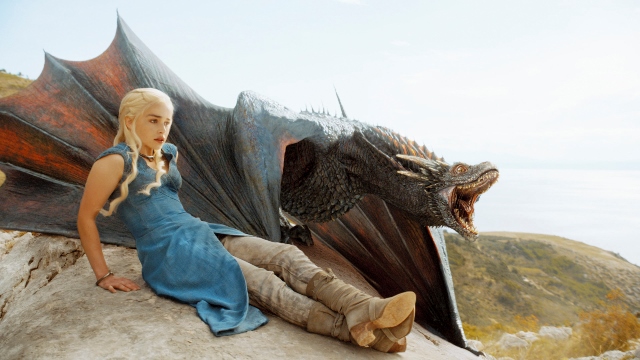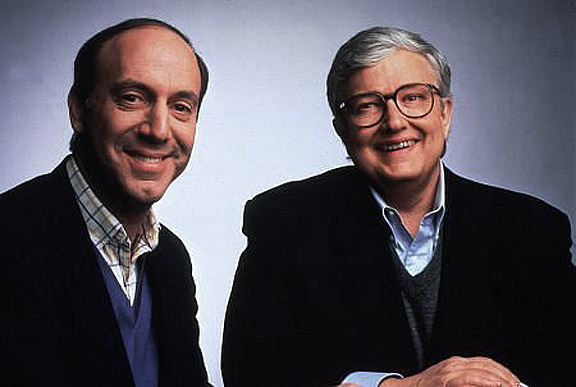“You’re a talker. Listening to talkers makes me thirsty.” –The
Hound, Episode 4.1, “Two Swords”
Isn’t everyone on HBO’s beloved “Game of Thrones” a talker?
It’s arguably the most defining quality of what makes an HBO program “Not TV”—the
willingness to allow characters to talk and talk and talk without concern over
the traditional plot requirements of the four-act structure of network drama. The
greatest HBO shows—“The Sopranos”, “Deadwood”, “The Wire” (and “True Detective”
is certainly in this vein as well)—redefined viewer expectations. “The Sopranos”
was a mob show, a traditionally action-driven genre, in which the best scenes
in multiple episodes over its run were character-driven dialogue exchanges. While
the plotting on David Milch and David Simon’s shows was certainly notable,
both shows thrived because of the verbal gifts put in the mouths of their
favorite characters. Milch created poetry of the guttural, and we reached a
point where we cared what Al Swearengen was going to SAY as much as what he was
going to do. It’s impossible to overstate how unusual that is for a medium that
was built on urgent plotlines that needed to be wrapped up before the final
commercial break. And, watching the first few episodes of the new season of “Game
of Thrones”, one is reminded how much this remarkable program fits in that dialogue-driven aesthetic and helps
fuel that expansion of what we’ve come to expect from TV.

“Game of Thrones” is one of those programs for which mentioning
much plot at all sends fans into fits. And so I will be very vague with
spoilers but I can tell you that fans of the books know that this 10-episode
season is going to make the Red Wedding look like a “Real Housewives” reunion.
The tone of foreboding horror that has blanketed the show for years now has
grown even denser. Winter isn’t just coming, it’s going to slit your throat and
throw your relative in a dungeon to be castrated. And yet what I find so
incredible about the start of season four is that there’s a tonal balance
within that dread. We still get wonderful moments of humor (mostly from Tyrion
and Arya and The Hound) and exquisitely rendered fantasy even as every scene
of gloriously scripted dialogue feels like it could end with a disemboweling.
In terms of plot, more of the characters seem to be hanging
at King’s Landing than ever now that Jaime Lannister (Nikolaj Coster-Waldau)
has returned, hoping to rekindle his affair with his sister Cersei (Lena
Headey) but unaware of how much has transpired since he’s been gone. Tyrion
(Peter Dinklage) is begrudgingly married to Sansa (Sophie Turner), still
fighting orders from his father Tywin (Charles Dance) to go forth and multiply.
I love how often the writers refuse to hold your hand even across seasons as
Tyrion’s lover Shae (Sibel Kekilli) is trying to figure out her place at King’s
Landing after being essentially ordered to leave at the end of last year. The “Game
of Thrones” writers don’t just allow plot threads like that to untraditionally
cross seasons but will set things up early in one season that don’t pay off for
over a year.
Back to our massive cast. The increasingly-powerful Daenerys
Targaryen (Emilia Clarke) is continuing to stretch her leadership as her
dragons and army grow. Arya (Maisie Williams) is stuck with The Hound (Rory
McCann) on a road trip from Hell. Theon (Alfie Allen) has been reduced to
almost nothing. Bran (Isaac Hempstead-Wright) is having increasingly dark
visions. Jon Snow (Kit Harington) works toward a leadership role he’s seemed
destined to hold for seasons. All of this leads up to another nuptial between
Margaery Tyrell (Natalie Dormer) and Joffrey Baratheon (Jack Gleeson) as the
fallout from the Red Wedding hangs in the air.
A ton of plot, right? And yet I have advised so many people
who claim that they can’t follow the numerous threads on “Game of Thrones” the
same thing—stop trying. Enjoy the moments; identify with the beats instead of
the overall picture, and trust that it will come together for you. I started to
love “Game of Thrones” when I gave up on figuring out how it all connected. Again,
HBO is changing how we experience and appreciate television with a commitment
to character that matches the art direction, costume design and special
effects, the traditional hallmarks of the fantasy genre. While Daeny’s dragons
look amazing, my favorite scenes in the premiere are a heartfelt dialogue
exchange between Tyrion and a devastated Sansa and the verbal interplay between
The Hound and Arya. As they have for three years, the blend of function and
character within the dialogue is breathtaking. One of the best shows of the
last several years feels as creatively vital as ever.

“Veep”
Speaking of verbal acuity, it’s the engine that drives
Armando Iannucci’s hit comedy about Selina Meyer (Julia Louis-Dreyfus), the
current Vice President who is mounting a run for the only office above her over
the course of the first five episodes sent for review. It was a brilliant
narrative move to shake up Meyer and her crack staff with the promise of the
Presidency as it allows each of these self-centered nuts a chance to crank up
their intensity now that a life-changing run is in their faces. Want to make an
intense political player more intense? Show them the potential of a better job.
And so the malice, greed, and general insanity on “Veep” feels amplified this
season, mostly for the better.
On a foundational level, the narrative of season three
allows the writers to get their characters out of the office. The season starts
with Meyer on a miserable book tour and progresses to poorly staged public
appearances and a hysterical appearance at a Silicon Valley company to get
campaign promotion. In fact, the characters of “Veep” are almost always on the
move in season three, scrambling to head off the next piece of bad press that
could come around every corner on a campaign. It gives the show a notable
energy that this incredible cast feeds off at every turn. Louis-Dreyfus can
still sell an uncomfortable political smile like no one else.
I will say that the tone this season seems somewhat
unnecessarily darker at times than in the first two (which may be hard to
believe but trust me). Dan (Reid Scott) has gone a bit off the mental
reservation in his desire to be Selina’s Campaign Manager, going as far as assaulting
Jonah (Timothy Simons) at one point. And about Jonah: he worked better in
smaller doses in the first two seasons, a scratching post for Dan and Mike
(Matt Walsh). He has a bit too much narrative in season three as his adventures
into the world of political blogging threaten to ruin Meyer’s run.
These are minor complaints for what is still a very funny,
smart show. The third and fourth episodes, which center around how
carefully-planned a campaign speech has to be to hit all of the right special
interests and the aforementioned trip to a Google-esque company, respectively,
contain some of the sharpest political satire of the year.
![]()
“Silicon Valley”
I wish I could say that Mike Judge’s new comedy felt half as
sharp as “Veep”. There are times when it promises to live up to its satirical
potential as a modern “Office Space” for the tech movement but it presents viewers with too little to
latch on to in terms of character. It improves in that department by the third
episode but I’ve always been hesitant to tell viewers to give a show that
much time to develop in today’s market of immediacy. And even though it
improves, I still find as much about “Silicon Valley” frustrating as I do
funny.
Thomas (Thomas Middleditch) works at an incubator deep in
the valley that’s run by the obnoxious Erlich (T.J. Miller) and manned by a few
other young tech developers: Dinesh (Kumail Nanjiani), Guilfoyle (Martin
Starr), and Big Head (Josh Brener). As so often happens, these technological
drillers strike oil when Thomas develops a remarkable compression program that
becomes the target of a bidding war.
“Silicon Valley” has some very solid laughs but traffics in stereotypes
that feel outdated—the nerd who can’t even look at a girl much less talk to her
or touch her, the young businessman who literally shakes when faced with career
potential. When it gets broad like that, especially countered against the
character-driven realism of other HBO shows, I get annoyed. And yet the
characters aren’t dense enough to hold the show together otherwise, which has
me sometimes longing for the more sitcom-ish set-ups. And so there’s this odd
push and pull; I want the show to be more realistic but I don’t care about
these characters enough when it chooses to be so. Both sides feel underdeveloped, a
fact that’s exacerbated by Mike Judge’s weakness as a director (he’s always
been a strong writer but clunky visually). I think “Silicon Valley” is damaged
further simply by being on the same night as two of the current HBO greats.
This start-up still has some creative work to do.












